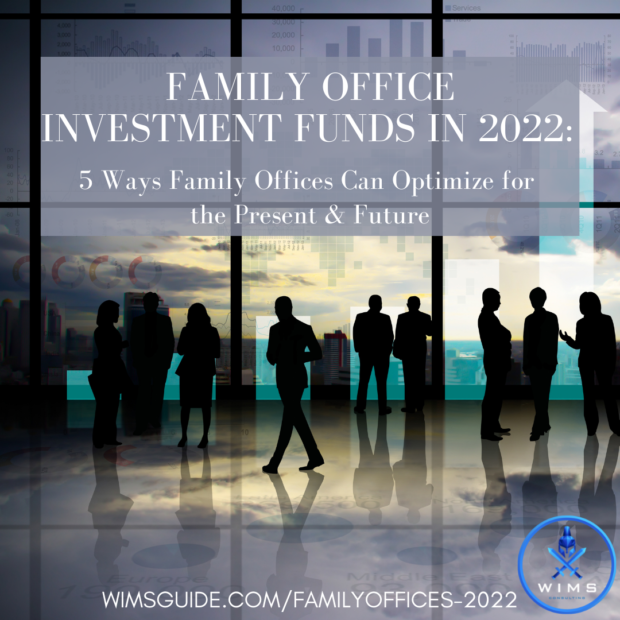Over the past 50 years, the amount of family offices has grown to an estimated 3,500-5,000 as ultra-high-net-worth (UHNW) investors have increasingly used this approach to leverage and manage their wealth. Whether it be through Single-Family Offices (SFO’s), Multi-Family Offices (MFO’s), or a combination of both through syndication, wealthy families have seen the advantages of customized structures that meet specific needs and go much more in-depth than just financial investments.
With family offices varying in size, scope, purpose, and operation, it’s impossible to define the specific actions family offices should take, but it is possible to highlight key themes and challenges that most family offices face and offer advice on how to deal with common situations that arise. The increased level of sophistication for these investors has created a need for constant communication and transparency to ensure everyone involved in deals is on the same page and held accountable to achieve the desired results.
Vision – Clearly Communicate Goals to Foster Alignment
Family offices need to communicate their goals and alignment to all players involved, from their internal teams to management at their portfolio companies and everyone in between. With varying scopes of family offices, the common goals tend to surround income, total assets, and legacy. There is a varying degree to which these topics are discussed and articulated among family offices. Mapping out priorities that articulate the desired purpose and direction for the family’s wealth will encourage proper decision making and the right strategy. The proper structure of the family office can then ensure that governance framework, operating processes, teams, and advisors are set up in a way to support the family office’s purpose and values to achieve specific goals. Further, it will help identify the right KPIs/metrics to track and measure against as well.
Operations – Set up the Proper Delegation of Duties
Once everyone knows and embraces their role, family offices can then fill in the gaps where they need help, making the whole process much simpler and clearer. These gaps can be filled through streamlining operations via outsourcing. Outsourcing to specialized agencies not only provides expertise and more eyes on what matters, but it also allows family office executives to focus on the areas they’re passionate about.
Deal Flow – The More Opportunities That Come Your Way the Better (if it is manageable)
The best deals typically come through referrals, but there are also plenty of solid opportunities that come in via cold calls, emails, pitch events, or online databases stacked with potential investments. No matter the source, access to these deals is paramount to succeeding in the private investing world. A few sources we have found useful are AngelList, PitchBook, LinkedIn, CrunchBase, etc.
In more of a nontraditional move, family offices can also find deals and collaborate through equity crowdfunding. A capital raise can start as Reg CF and later convert a round to Reg A. Start-ups are increasingly seeing the value in crowdfunding to raise initial capital as it helps to validate their business model and market fit. With less regulation than private equity, investors can also benefit from getting involved and take more ownership of great ideas at an early stage.
Syndicate Investments to Reduce Risk, Increase Upside, and Achieve Economies of Scale
Most family offices already co-invest through syndication with other family offices. Yet this only increases the need for transparency from all firms involved: the family offices, their teams, portfolio companies, and any outsourced agencies that are involved in establishing a smoother operation. Syndicating deals allows you to reduce the downside by committing less capital, it increases the amount of relationships/resources that the target company can leverage, and it also enables each family office/fund to be able to split expenses when appropriate.
Finding and deploying the right consulting firm is a key example of this, due to the essential need for trust and objective parties when dealing with a large amount of wealth from a small number of sources. If family offices do choose to outsource certain operational functions (like marketing, sales, finance, etc.), a firm that provides constant communication and quick action to resolve issues is necessary. With the right external agency, family offices can concentrate on the roles that align with their purpose and passion with respect to running a successful operation. Not to mention, they save even more capital by not having to hire full-time positions to do what these outsourced specialists have been doing well for years.
Succession Planning – Always Keep an Eye on the Future
Succession is one event that family offices must have even though it can be uncomfortable. Having a contingency plan in place allows for smooth transitions and operational stability across the board when the time comes. This could mean planning for the transition from one generation of principal(s) to the next, or from one family office executive to the next. CEO’s tend to be in their position for an average of approximately 5 years. For family offices, managing directors and executives tend to hold these offices for 10 years as they have established a rapport with the investor families. This means that much more of the operations are in the hands of the family office executives than in traditional businesses.
When succession occurs with these individuals, it can be tough for the family office to stay on course if objectives and procedures have not been communicated. Understanding the role of the family, the family office, the portfolio companies, and any external firms in the event of succession is key in mitigating risks and obstacles that can cause disruption. With less regulation and oversight regarding practices of family offices, a lot more is done on an informal basis, leading to the possibility of overlooking key operations. With a clear and defined plan, it provides an easier transition when any type of succession inevitably occurs.
Conclusion
As you look to scale your operations, investments, and grow, there are clearly a variety of routes to take. The key is determining the route that best fits your family office’s vision, the portfolio companies you want to invest in, and then ensuring that all parties involved, whether in-house or external, all understand and are committed to executing it.
Written By: Mike Simmons and Evan Shirreffs.
THE PRIMARY MISSION OF WIMS CONSULTING IS TO HELP YOUR FUND AND ITS PORTFOLIO COMPANIES GENERATE A HIGHER ROI NOT ONLY INTERNALLY, BUT ON BEHALF OF YOUR INVESTORS AS WELL. WE CAN ASSIST WITH SCALING YOUR INVESTMENTS TO HELP INCREASE VALUATIONS IN ADVANCE OF ADDITIONAL FUNDING ROUNDS, LIQUIDITY EVENTS, EXITS, OR IPOs. WE CAN PROVIDE A LOT OF DIFFERENT SERVICES, CREATE AND IMPLEMENT A ROBUST STRATEGY, AND EXECUTE EACH TACTIC, BUT EVERYTHING THAT WE DO TRULY BOILS DOWN TO THAT ONE SINGLE OBJECTIVE OF ADDING MORE VALUE TO YOUR FIRM.




